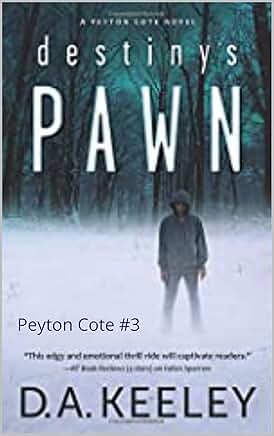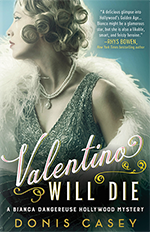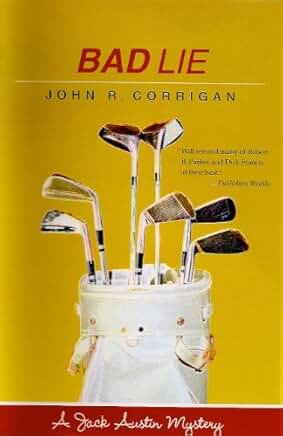
I’m so happy to welcome as my guest my fellow Type M 4 Murder blogmate John R. Corrigan, who also writes as D.A. Keeley, and K.A. Delaney (his daughters are Delaney, Audrey, and Keeley). John is the director of the upper school at Detroit Country Day School in suburban Detroit. Under his own name, he has written five Jack Austin PGA Tour mysteries. As K.A. Delaney, he wrote This One Day, a stand-alone thriller, and as D.A. Keeley, the Peyton Cote US Border Patrol series, which was nominated for the Maine Literary Prize as Best Crime Novel of 2015 and in 2022 was optioned for TV and film. Check out John’s many incarnations on Amazon by clicking here.
A Report Card in Winter
By John R. Corrigan

A 10-year-old boy stands, holding a report card like a brick before the front door of a house in
rural, central Maine. It is cold, and he wants to go inside. At the same time, he doesn’t want to go inside. Not this day. Not holding that report card.
That day, back in 1980, was a defining moment in my life, one I recall often. The report card exposed a lot about me. I did not yet know the reason for the failing grade I had earned in math, but I soon would: I am dyslexic, something that led me to become a writer, as counter intuitive as that may sound.
I am awestruck by the essay “A Drugstore in Winter,” by Cynthia Ozick. Like all of her work, each word of the essay feels like it was held up to a light, examined, carefully dusted, and gently set in place. In addition to its lyrical prose, the piece also explains why Ozick, a shy girl who stood on the sidelines, became a writer, detailing her relationship with language and books. My story, although never as elegantly told as Ozick’s, also has its roots tethered to my own “old school hurts,” as Ozick calls them, but also tied to the influence of one great teacher and to my late mother, who left college after one year but always had a book in her hand.
Many people I meet are surprised to learn that I was never a strong student or even someone who enjoyed school. (It wasn’t until college and grad school that I excelled.) However, now I’m the upper school director at Detroit Country Day School, in charge of the program and its impact on 620 families. Ironic? I guess a little. Yet my academic struggles taught me the importance of teachers and how one good teacher can change a student’s life.
My second-grade teacher, Peggy Buxton, was such a teacher. Mrs. Buxton, upon hearing my stammering attempts to read aloud and seeing me count paragraphs and match them to classmates to find when my next humiliating turn would come so I could practice silently beforehand –– told my mother to let me read whatever I wanted, so long as I read each night. I had fallen in love with hockey by then, and my parents got me a subscription to The Hockey News, a weekly publication dedicated to the National Hockey League. I read it –– albeit slowly –– cover to cover, each week. Later, in college, with no high school journalism experience, I was hired by the college paper and a daily (where I worked nights), to write sports articles. Osmosis, for a writer, is a powerful thing.
I would have other caring and creative educators impact me. However, after entering the profession myself and considering the time and place, (this was long before Mind Brain Education Science was used to impact pedagogy or “culturally responsive” classrooms were in vogue,) I realize just how far ahead of her time Peggy Buxton was. And I am grateful. Not only did she meet a young learner where he was at, she was probably stepping out on a ledge for me, presumably breaking school policy by allowing me to read something not approved and giving me academic credit for it.
However, the single most important person in my writing career is one I just recently lost, my mother. When I was 16, my mother, who read everything and always, handed me Ceremony, by Robert B Parker. I was introduced to Spenser and Hawk and Susan and learned of a wonderful concept, moral ambiguity, which attracts so many of us to crime fiction. “It’s a way to live. The rest is just confusion,” Spenser reminds us in the novel. It’s a line I have held onto and one that defines the genre in many ways for me.
My mother passed just before Thanksgiving last year. I knew she was failing and had seen a decline over the past couple years, but it was one phone call that sent me back to Maine, fearing the worst. “What are you reading?” I asked Mom while driving home from school one evening. “I’m not interested in reading,” she said. I was on the next flight back to Maine from Detroit. She wasn’t with us this year for Thanksgiving or Christmas, but I held my annual employee Yankee (used and recommended) book swap in her honor.
At the end of the day, I got into this crazy writing life, one where, as Hemingway said, “we are all apprentices in a craft where no one ever becomes a master,” and I continue in it because of the influence of two great women.




More Places to Go
Donis on Facebook
Type M for Murder